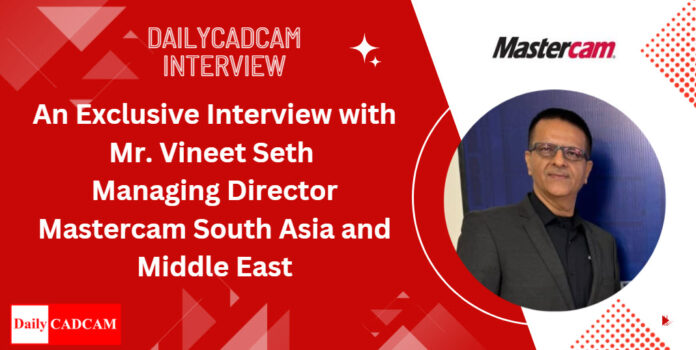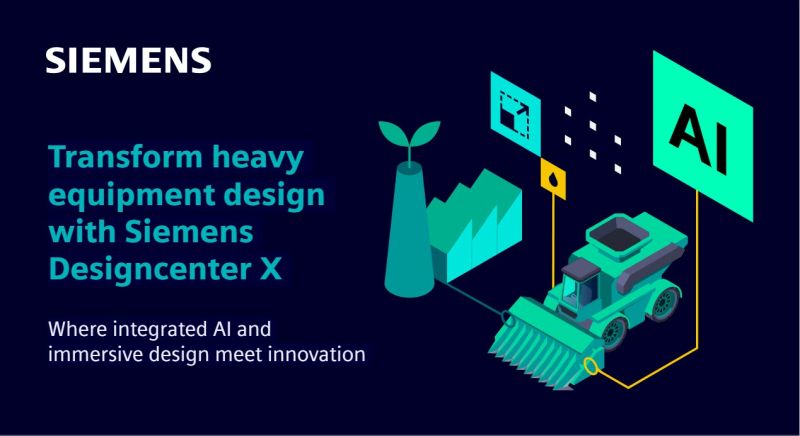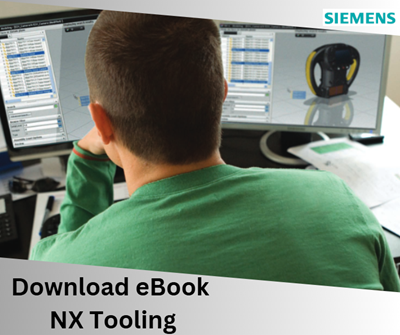During the launch of Performance Series Machine Tools at PETECH by Phillips Machine Tools India (a Phillips Machine Tools group company), DailyCADCAM had the opportunity to sit down with Mr. Vineet Seth, Managing Director – Mastercam South Asia and Middle East. Our discussion covered Mastercam’s partnership with Phillips, post processors, precision manufacturing, AI, hybrid manufacturing, robotics, skill development initiatives with Tata Technologies, startups, and more.
Q1. Mastercam and Phillips Machine Tools have had a long association. Can you tell us about this partnership, especially in the context of PETECH?
Vineet Seth:
Our association with Phillips goes back many years, and it has truly been a partnership built on trust, shared goals, and people-to-people relationships. Terrence (MD Phillips Machine Tools India) and I first crossed paths about 25 years ago when I was associated with another brand. When I moved to Mastercam, we reconnected, and the collaboration just felt natural.
What has always stood out to me is that while brands and machines are important, it is ultimately the people behind them that determine the strength of a relationship. The Phillips team and our team had a natural synergy, and over time this relationship evolved into several joint initiatives.
The PETECH initiative is particularly exciting because it fills a critical gap in the market. Until recently, manufacturers had to choose between entry-level, low-cost machines with limited capability or very high-end, expensive ones that were often out of reach for MSMEs. PETECH is changing that equation by offering machines that deliver precision, reliability, and performance at an affordable price point.
With this initiative, MSMEs can diversify their operations, take on more complex jobs, and improve their competitiveness without the heavy burden of investing in prohibitively expensive equipment. For us at Mastercam, being part of this journey means we can support these customers with the right CAM software, enabling them to achieve the full potential of their machines and thrive in a highly competitive manufacturing landscape.
Q2. Post processors are crucial in CAM environments. How does Mastercam support its customers in this area?
Vineet Seth:
Post processors are really the unsung heroes of modern machining. While the CAM software generates toolpaths, it is the post processor that ensures those toolpaths translate correctly to the unique language and logic of each CNC machine. In today’s world, where machine tools are becoming increasingly sophisticated with multi-axis, multi-turret, and even hybrid capabilities, a one-size-fits-all approach to post processors simply does not work.
At Mastercam India, we recognized this challenge early on. That’s why we’ve built dedicated post-processor development teams in Pune and Bangalore. These teams don’t just work in isolation; they are constantly interacting with customers and machine tool partners to understand the specific nuances of each machine, controller, and shop-floor requirement.
Even two machines from the same brand and series can have subtle differences in configuration—such as tooling setups, attachments, or custom macros—that need to be accounted for. Our engineers ensure that the post processors are fine-tuned to handle these variations, delivering consistent accuracy and reliability.
The result is that when a customer programs in Mastercam, they can trust that the output code will run smoothly on their machine, minimizing downtime, errors, and costly crashes. In fact, we often collaborate with machine tool builders and distributors during the sales process itself, ensuring that when the machine is delivered to the customer, a fully functional post processor is ready to go.
This level of attention to detail not only helps customers achieve better results but also builds long-term confidence in both Mastercam and the machines they use.
Q3. How important is CAM software in precision manufacturing?
Vineet Seth:
CAM software is absolutely vital to precision manufacturing. In fact, I would say it is the backbone of the entire process. Modern precision parts—whether for aerospace, automotive, medical, or defence—demand tolerances in microns, surface finishes that meet international standards, and production cycles that are both efficient and repeatable. Achieving all of this without robust CAM software is virtually impossible.
But CAM is not just about toolpaths—it’s about the entire ecosystem of machining. First, you need a solution that is technically advanced, proven, and capable of handling everything from 2-axis milling to complex 5-axis simultaneous machining. That’s the pedigree Mastercam brings, having been the world’s leading CAM solution for decades.
Second, and equally important, is the support structure behind the software. Even the best CAM tool will fall short if customers don’t have timely assistance, training, and guidance. At Mastercam India, we pride ourselves on offering strong local support, both on-site and online. Our teams are always ready to help customers overcome challenges, improve processes, and push their capabilities further.
This combination—robust software and a strong support network—empowers manufacturers to consistently deliver high-precision results, reduce costs, and enhance productivity. It is what makes CAM software not just important but indispensable to modern precision manufacturing.
Q4. Aerospace and defence require high precision. How is Mastercam helping manufacturers enter these segments?
Vineet Seth:
Aerospace and defence are among the most demanding manufacturing sectors in terms of precision, quality, and compliance. The parts are often complex, the materials difficult to machine, and the tolerances extremely tight. For many manufacturers, entering these segments can seem intimidating.
This is where Mastercam plays a key role. Our software is designed to handle advanced toolpaths that are optimized for complex geometries, various materials, and stringent requirements. For example, when machining titanium or Inconel—materials commonly used in aerospace—toolpath strategies like dynamic milling help reduce cycle times, extend tool life, and maintain part integrity.
Beyond just software, we actively support customers with proof-of-concept parts. When a manufacturer wants to bid for an aerospace or defence contract, they often need to demonstrate their ability to produce a part with the required precision. Our team works with them to program, simulate, and sometimes even machine the part to showcase what is possible with Mastercam. This gives them confidence and credibility when competing for such projects.
We also focus heavily on training and upskilling. Aerospace and defence projects require not just the right tools but also the right people. By ensuring our customers’ teams are well-trained, we help them transition smoothly into these high-value sectors. With India investing heavily in aerospace, defence, and energy, the opportunities are immense, and Mastercam is proud to be enabling our customers to be part of this growth story.
Q5. AI is transforming design and manufacturing. How is Mastercam integrating AI into its solutions?
Vineet Seth:
Artificial Intelligence is undoubtedly one of the most exciting developments in technology today, and its potential in manufacturing is enormous. At Mastercam, we see AI not as a replacement for human expertise but as a powerful assistant that can handle repetitive, mundane, and time-consuming tasks, allowing machinists and programmers to focus on decision-making and innovation.
We recently introduced the AI Co-Pilot in Mastercam, which acts as a smart assistant within the CAM environment. For example, when a programmer is working on a part, the Co-Pilot can suggest programming strategies based on proven knowledge bases and historical data. It can recommend the best toolpaths, cutting parameters, or machining approaches, reducing the trial-and-error process and improving overall efficiency.
The Co-Pilot also helps standardize programming practices within a shop. In many organizations, different programmers may approach the same job differently, leading to inconsistencies. With AI assistance, best practices can be applied more uniformly, ensuring reliability and repeatability across the board.
Of course, this is just the beginning. AI in CAM is a journey, and we are taking the first steps. In the future, we envision AI playing a larger role in predictive machining, process optimization, and even autonomous programming. But the guiding principle will remain the same: empowering professionals, not replacing them.
Q6. Hybrid manufacturing is gaining traction. What role does Mastercam play in this?
Vineet Seth:
Hybrid manufacturing—which combines additive and subtractive technologies—represents one of the most exciting frontiers in modern manufacturing. Traditionally, additive and subtractive processes were seen as separate domains: 3D printing for prototyping and CNC machining for production. But when you bring the two together, the possibilities expand dramatically.
For instance, imagine a worn-out component, may be marine or energy sector, where we have huge components. Instead of scrapping it entirely, you can use additive processes like Directed Energy Deposition (DED) to rebuild the damaged area, and then use subtractive machining to finish it back to tolerance. This approach not only saves costs but also reduces lead times and material waste.
At Mastercam, we enable this through Mastercam APlus, an add-on developed in partnership with CAMufacturing Solutions. APlus integrates seamlessly into the Mastercam environment, allowing machinists to program additive and subtractive operations side by side. Users can deposit material where needed, then switch directly to CNC machining without leaving the software.
This hybrid approach is especially valuable in industries like aerospace, defence, energy, and heavy engineering, where part replacement can be extremely expensive and time-consuming. With hybrid manufacturing, companies can extend the life of critical parts, create prototypes faster, and explore innovative design possibilities that were previously impractical.
For Indian manufacturers, hybrid technology represents both an opportunity and a challenge. Adoption is still in the early stages, but as costs come down and awareness increases, I see hybrid becoming a mainstream option. Mastercam is proud to be providing the tools that make this transition practical and effective.
Q7. Robotics and automation are becoming mainstream. How is Mastercam supporting this trend?
Vineet Seth:
Robotics and automation are no longer futuristic—they are here, and they are becoming increasingly critical to remain competitive. From robotic machining and welding to 3D printing and material handling, robots are being integrated into shop floors across industries.
At Mastercam, we’ve recognized this shift and have invested in tools that make robotics accessible even for MSMEs and smaller shops. One of our flagship solutions in this space is Mastercam Robotmaster. Traditionally, programming robots has been a highly complex and time-consuming task, requiring specialized expertise. Robotmaster simplifies this by providing an intuitive interface within Mastercam that allows users to program robots as easily as they would program CNC machines.
The benefits are significant. Robot programming time can be reduced by up to 75%, and the risk of errors—such as collisions or inaccurate toolpaths—is minimized through advanced simulation. This not only saves time and money but also gives customers confidence that their robotic systems will work exactly as intended.
Beyond robotics, we also address metrology and quality control, which are essential parts of automation. With Verisurf, we provide advanced metrology solutions that allow even MSMEs to perform precision measurement and inspection without needing deep expertise. This ensures that automation isn’t just about faster production but also about maintaining the highest quality standards.
When you combine these capabilities—robotics through Robotmaster, metrology through Verisurf, and hybrid manufacturing through APlus—you get a comprehensive ecosystem that allows manufacturers to automate intelligently and compete on a global scale.
Q8. Mastercam and Tata Technologies have partnered to set up Centres of Excellence. Can you share more about this initiative?
Vineet Seth:
This is one of the initiatives I am personally most proud of, because it combines two things I care deeply about: education and industry-readiness. Around the time of the COVID-19 pandemic, Tata Technologies launched a visionary program to modernize India’s Industrial Training Institutes (ITIs). The goal was to upgrade infrastructure, curriculum, and training so that students graduating from ITIs would be job-ready from day one.
Mastercam became a key partner in this initiative. We worked with Tata Technologies to install Mastercam across hundreds of ITIs, provide faculty training, and create an environment where students could learn on the same software and equipment used in industry. Today, more than 700 ITIs have been modernized through this program, and over 14,000 Mastercam licenses have been deployed across India.
To put this in perspective: if each ITI has about 20 seats of Mastercam, and each year thousands of students’ study in ITIs, we are talking about 30,000–35,000 students annually who are already skilled in Mastercam before they enter the workforce. That’s a massive impact.
The feedback has been heartwarming. We’ve heard stories of students from small towns and villages who, after training on Mastercam in their ITIs, secured jobs in advanced manufacturing companies. For many of them, it is a life-changing opportunity.
What excites me the most is that this isn’t just about meeting the needs of today’s industry—it’s about preparing India for the future. As technologies like AI, robotics, and hybrid manufacturing become mainstream, having a workforce that is comfortable with modern CAM tools will be a huge competitive advantage.
Q9. Startups often face challenges, from competition to sustainability. What is your perspective on India’s manufacturing startups?
Vineet Seth:
Startups are an essential part of any thriving economy because they bring fresh ideas, challenge the status quo, and often pioneer new technologies. In India, the startup ecosystem has flourished in areas like IT, fintech, and e-commerce. In manufacturing, however, the journey is a bit more challenging.
Unlike software startups, manufacturing startups require significant capital investment in machines, infrastructure, and skilled manpower. They also face longer gestation periods before profitability. That said, the opportunities are immense—particularly in areas like advanced materials, additive manufacturing, robotics, and precision engineering.
What is most important for startups is to be built not just on ideas but on sound business models. Having an innovative idea is a great starting point, but it must be backed by execution, scalability, and sustainability. Investors today are more cautious; they want to see proof of concept, real-world applicability, and a clear path to revenue.
India has a unique advantage in this space. With such a large population, startups can test, refine, and scale their products quickly in a domestic market before expanding globally. Additionally, government initiatives like Make in India and Startup India are providing valuable support through funding, mentorship, and policy frameworks.
For manufacturing startups, my advice would be: focus on solving real problems, stay grounded in practical business fundamentals, and leverage India’s ecosystem to test and grow. If you do that, competition won’t be a barrier—it will be a validation of your idea.
Q10: It is said that Mastercam is a CAD/CAM solution. Can you tell us more about the CAD solution offered by Mastercam?
Vineet Seth:
Certainly. Our CAD solution is Mastercam Design, a tool specifically built to prepare geometry for CNC machining. It is fully integrated into Mastercam’s CAM-focused ecosystem, making it ideal for machinists who need to quickly create or modify models for manufacturing. The strength of Mastercam Design lies in its simplicity and seamless connection to CAM, ensuring that users can move from design to toolpath generation efficiently. While it doesn’t provide the advanced parametric modeling capabilities found in solutions like SOLIDWORKS or Creo, it is purpose-built for manufacturing workflows. This makes it highly effective when the primary objective is producing accurate toolpaths rather than developing complex assemblies or detailed engineering designs.
Q11. What is your advice to Indian manufacturers when competing globally?
Vineet Seth:
India has always had the talent, ingenuity, and resilience to compete globally. What we need to focus on now is quality, consistency, and scalability. Too often, manufacturers are content with meeting domestic demand. While this is important, the real opportunity lies in positioning ourselves as reliable global suppliers.
One of the key shifts we must embrace is the mindset of producing not just for India but for the world. When you manufacture for global markets, you must meet international benchmarks in quality, compliance, and delivery. This forces continuous improvement and innovation.
At the same time, we should never underestimate the power of being self-reliant. Every time we produce an import substitute—whether it’s a critical aerospace part, a precision automotive component, or a medical device—we are reducing dependence and strengthening India’s industrial base.
My advice to manufacturers is simple: adopt advanced technologies like CAM, robotics, and automation not as luxuries but as necessities. Invest in training your people, maintain quality as your non-negotiable priority, and don’t shy away from competing with the best globally.
If we can do this, the label Made in India will not only be common but also synonymous with quality and reliability worldwide.
DailyCADCAM extends its sincere gratitude to Mr. Vineet Seth for sharing his valuable insights during the launch of the Performance Series Machine Tools at PETECH by Phillips Machine Tools India. We appreciate his thoughtful responses and look forward to seeing how Mastercam and PETECH continues to empower manufacturers in India and around the world.
Thank you,
SACHIN NALAWADE, Editor DailyCADCAM



